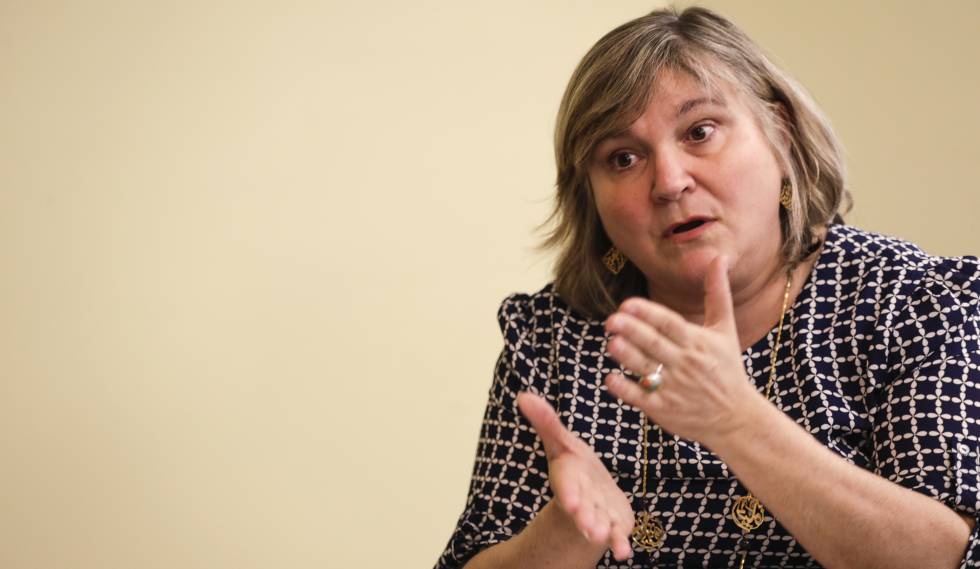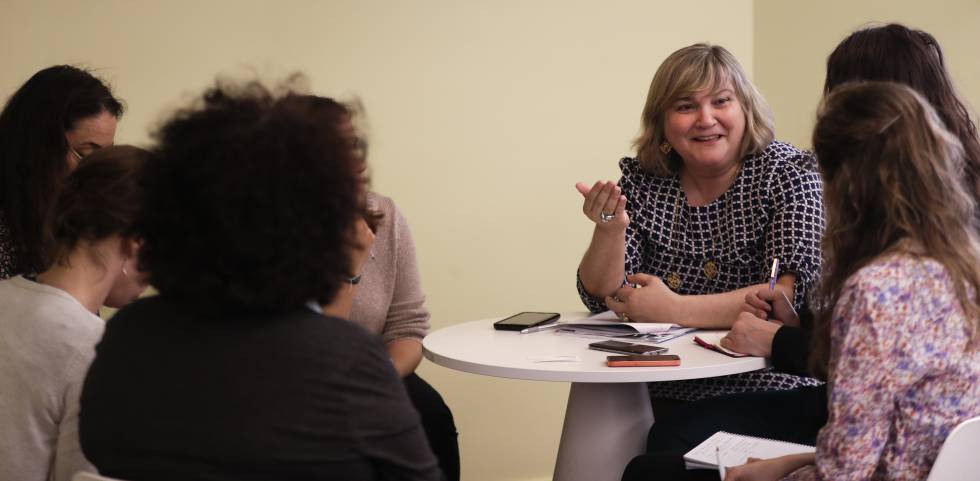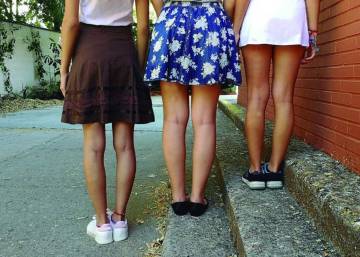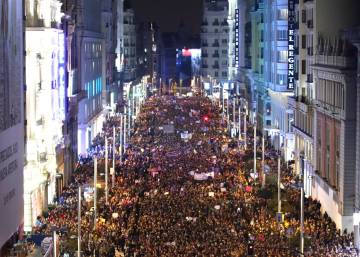UN Women program director: “Men must be part of modern feminism”
María Noel Vaeza explains why the next generation of feminists needs to include the opposite sex

María Noel Vaeza, UN Women program director. GEMA GARCÍA
Madrid
Rome wasn’t built in a day and dismantling gender stereotypes that perpetuate sexist attitudes is a goal that, according to María Noel Vaeza, UN Women program director, will be achieved gradually with perseverance. “Not all men are predators. Many don’t want to be tarred with the same brush,” she says. Which is why she is advocating a modern style of feminism that involves men. “They can be part of it too,” she says during a recent visit to Madrid to present the UN’s Safe City program.
It is not just the matter of gender violence, it’s access to justice, economic empowerment and alliances
While the recent allegations of sexual abuse within the movie industry gave birth to the #MeToo movement, its predecessor in Latin America was a movement called #NiUnaMenos (not one less) that waged war against gender violence in that part of the world. Women’s movements are gaining momentum as became obvious on March 8 when Women’s Day brought hundreds of thousands out onto streets across the world to flag up issues of inequality and abuse. This insubordination is a phenomenon reaching the remotest corners of the globe, according to Vaeza. “It is as though people are waking up and saying, ‘Okay, enough. Now it’s time to talk’.”
The Uruguayan director is not only in favor of these movements, but she also wants to actively foster them. “But not in the elitist feminism tradition,” she explains. “It should be a young feminism that includes men; young, dynamic men who are seeking a new masculinity. We believe this is fundamental.”
Spain is currently in turmoil over the gang rape case in which five young men repeatedly penetrated a young women against her will at the famous San Fermín festival in Pamplona in 2016. A court recently sentenced the men to prolonged sexual abuse instead of rape. The verdict has opened up the debate on the current laws concerning sexual offenses in Spain. Shortly after the ruling, a woman was gang raped closed to a metro station in Chile and in India a young women who alleged gang rape was burned alive for identifying her attackers to the police. Clearly, something needs to change.

However, Vaeza speaks slowly but firmly about the need to create a movement that addresses all areas affecting women. “It is not just the matter of gender violence, it’s access to justice, economic empowerment and alliances. In parliaments [around the world] the average number of women is 23%. Only 9% of mayors are women. This is nothing,” she says.
The male support for the UN initiative HeForShe, in which 10 presidents have participated, including Uruguay’s Tabaré Vázquez, as well as notable figures from the worlds of business and academia, has boosted Vaeza’s optimism. But she also sees the need for a more caring culture. “If there are no public policies that clearly address the care of the elderly and children, it’s impossible for economies to grow and women to go out to work,” she says.
The economy is another important factor. “If economic growth is stagnating worldwide it’s because women are not participating and, until they do, there won’t be growth,” she says.
In 56 countries, women are not able to open a bank account by themselves
Citing various pieces of research, she claims that the world economy would increase by a third if women were participating fully in the workforce. “We are talking trillions of dollars. What are we waiting for? Our society continues to be patriarchal. Out of 200 countries, there are just 11 female presidents,” she says, adding that there are still 56 countries where women are not able to inherit land or open a bank account and societies in which divorced women are severely marginalized.
“It’s a question of power. Let’s say it loud and clear,” says Vaeza who believes this is at the root of the entire inequality conundrum. “Whoever has power, is loathed to give it up and it’s a case of dismantling those prototypes.”
Vaeza is in favor of quotas, albeit temporary ones that will turn the tide and get women out to work. Even then, it is estimated that women will take 89 years before they are on an equal economic footing with men. “It’s not a question of overshadowing or replacing because if you make the pie bigger, you’re not taking any away from anyone,” she says.
SAFE CITIES
María Noel Vaeza was in Madrid to present the Safe Cities project, a UN initiative that aims to collect data on challenging situations women face in their daily lives, whether that be sexist attitudes, abuse or a lack of security in public places. Madrid is one of 28 cities participating, along with Cairo, Kigali and New Delhi.
In Dublin and the Ecuadorian capital of Quito, for example, research revealed that public spaces needed to be more inclusive, secure and welcoming. In Quito, a local law was even passed to make the prosecution of sexual abuse in public places more effective while aspects of the transport system were also overhauled to include passageways with transparent glass, the redesign of stations and an app to report attacks.
Keen to improve the exchange of data between institutions, UN Women seeks the support of big business to get rid of stereotypes and to work on initiatives to criminalize sexual abuse on the streets.
English version by Heather Galloway.









































No hay comentarios:
Publicar un comentario